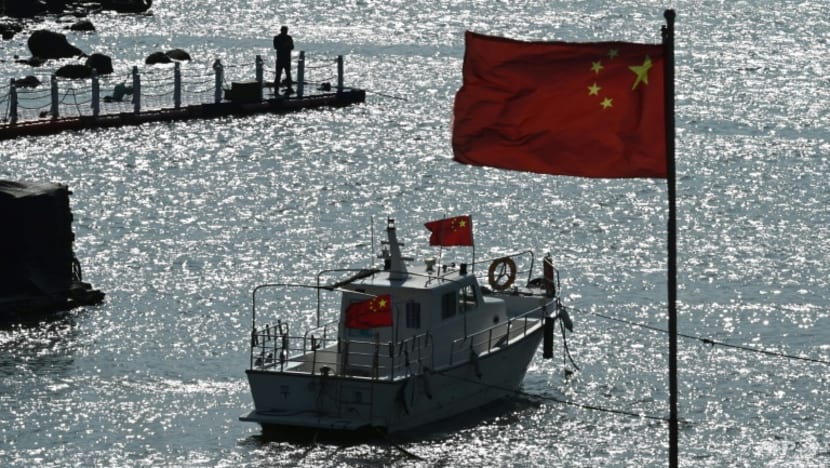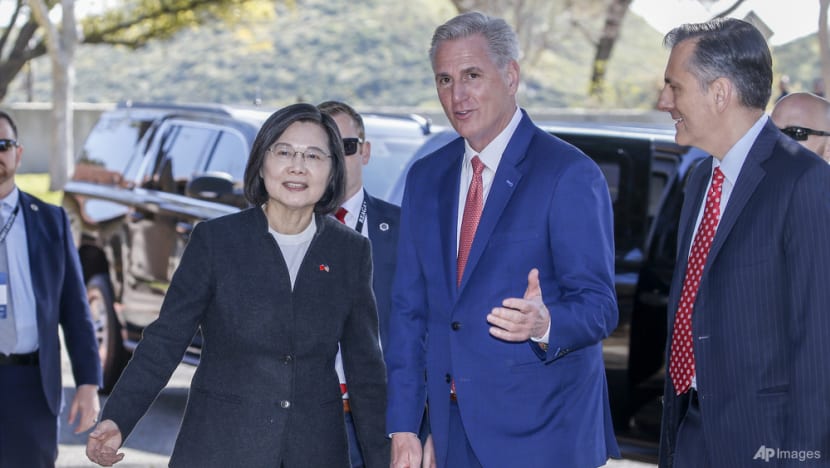China's military drills ‘more muted’ to avoid disrupting sea lanes, trade after reopening: Analysts
China began three days of military exercises around Taiwan on Saturday (Apr 8), simulating precision strikes against the island, a day after Ms Tsai returned from a brief visit to the United States.

China’s military drills in response to Taiwanese President Tsai Ing-wen’s visit to the United States was more “muted” compared to its show of force following former US House Speaker Nancy Pelosi’s visit to the island last year, analysts said on Monday (Apr 10).
They told CNA that the type of weapons deployed in the exercises suggest that China does not want to disrupt sea lanes and trade, and that its actions are in part for a domestic audience.
“Based on the types of military assets that are being deployed in this three-day exercise, they appear to be more muted when compared to the exercises in August 2022,” said principal defence analyst Ridzwan Rahmat of defence intelligence agency Janes.
There have been no “groundbreaking weapons”, such as ballistic missiles, deployed so far, Mr Ridzwan told CNA’s Asia First.
China began three days of military exercises around Taiwan on Saturday simulating precision strikes against the island, a day after Ms Tsai returned from the brief visit, during which she met US House Speaker Kevin McCarthy.
It said the operations are “necessary for safeguarding China's national sovereignty and territorial integrity”.
China views democratic, self-ruled Taiwan as part of its territory and has pledged to one day seize it, by force if necessary.
AVOIDING DISRUPTIONS TO TRADE
Mr Ridzwan added that while Chinese aircraft have violated the median line, China is trying to avoid the same disruptions it caused to international shipping back in August last year.
“On the back of China's reopening, I think China may have shifted its focus towards normalising trade and does not want to disrupt trade as much, given its economy.”
China has increased its military activity near the island over the past three years, responding to what it calls "collusion" between Taipei and Washington, Taiwan's main international backer and arms supplier.

However, Mr Ridzwan noted that the Chinese weapons deployed are getting “smaller and more tactical”, such as unmanned aerial vehicles used in reconnaissance missions and more targeted operations, compared to big planes and bombs.
These drills are part of an ongoing Chinese plan to test how well the island can detect the military assets, and Taiwan is aware of it, said Mr Ridzwan.
“I think other than military drills, Beijing does not have a lot of options with how to respond,” he said, adding that the Chinese can also dish out sanctions, as they have done against Taipei’s representative to the US.
However, China still relies heavily on free trade that passes through this region, said Mr Ridzwan, and to disrupt the sea lines of communications that go through Taiwan means impacting its own ports too.
“At this juncture, China still relies a lot on US-made commodities like chips and even basic commodities like soybeans, for its survival,” he noted.
DOMESTIC CONCERNS
Dr Benjamin Ho, assistant professor at the S Rajaratnam School of International Studies’ China Programme, said Beijing is “simply aiming” to send the message that “any high-level contact between Taiwan and the outside world is not acceptable to it”.
Dr Ho said that China’s actions are in part “for a domestic audience back home”.
“Obviously Beijing needs to signal its resolve to oppose Taiwanese activities that have the potential to undercut its authority over Taipei, and to express its opposition,” he told CNA938
“The Taiwanese would say that if it's their right to go into all sorts of international engagements with foreign partners (but) the Chinese view such meetings as being in violation of their sovereignty over Taiwan.”
The Taiwanese are also keeping one eye on the upcoming presidential election in January next year.
Mr Ridzwan said that based on past occasions, there is a long-running perception that the pro-unification Kuomintang (KMT) party tends to lose support, whenever there is a Chinese military exercise.
“But if you were to look at the latest presidential election, that kind of perception has not really materialised,” he noted.
While polls showed many Taiwanese do not accept the actions that China took following Mrs Pelosi’s visit last August, it did not translate into a similar level of support for the Democratic Progressive Party (DPP) in last November’s local elections, he said.
“I think a lot of other domestic factors, such as the economy, still factor a lot into how Taiwanese vote,” said Mr Ridzwan.
Dr Ho said that under Ms Tsai’s leadership, “it is quite clear that her party has indeed stood up to the CCP”, and it will appeal to certain segments of Taiwanese society who do not want to see Taiwan grow closer to China.
He added that the everyday Taiwanese would not be too bothered by the ongoing tensions with China.
“They have been experiencing such sabre rattling for the last 70 years. So this, in a sense, is something that is not very different from what they have experienced,” he said.
The Taiwanese government has increased the term of national service from four months to one year, placing a spotlight on the need for security, he added. However, nothing much else impacts their daily lives.
“I would think that right now the Taiwanese are still going about their own lives without too much worry,” he said.














